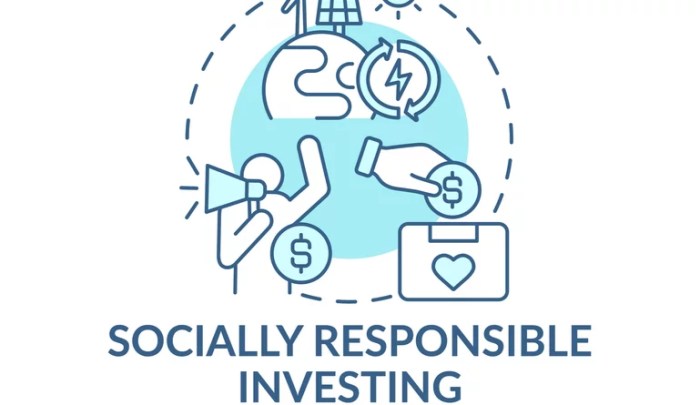Get ready to dive into the world of socially responsible investing, where financial decisions meet ethical considerations. This modern approach to investing is not just about making money—it’s about making a difference.
As we unravel the complexities of socially responsible investing, you’ll discover how your investment choices can shape a better future for both your portfolio and the planet.
What is Socially Responsible Investing?
Socially responsible investing (SRI) is an investment strategy that considers both financial returns and social/environmental impact. It involves selecting investments based on ethical, social, and environmental criteria.
Principles behind Socially Responsible Investing
Socially responsible investing is guided by the following principles:
- Environmental sustainability
- Social justice
- Corporate governance
- Community development
Examples of Companies or Funds in Socially Responsible Investing
Some examples of companies or funds that practice socially responsible investing include:
- Calvert Impact Capital
- Trillium Asset Management
- Pax World Funds
- Domini Impact Investments
Benefits of Socially Responsible Investing
Investing in a socially responsible manner not only benefits the investor but also has a positive impact on society and the environment. Let’s explore the advantages of socially responsible investing and how it can make a difference.
Advantages for Investors
- Aligning values with investments: Socially responsible investing allows investors to support causes they believe in, such as environmental sustainability, human rights, or gender equality.
- Long-term performance: Studies have shown that companies with strong environmental, social, and governance (ESG) practices tend to outperform their peers over the long term, leading to potentially higher returns for investors.
- Risk management: Companies with good ESG practices are often more resilient to risks such as regulatory changes, lawsuits, or reputational damage, reducing the overall investment risk.
Positive Impact on Society and the Environment
- Encouraging responsible business practices: By investing in companies with ethical standards, socially responsible investors can influence corporate behavior and promote positive change in industries.
- Supporting sustainable development: Investing in renewable energy, clean technology, or fair labor practices can contribute to a more sustainable future for both society and the environment.
- Addressing social issues: Socially responsible investments can help address pressing social issues like poverty, inequality, and access to education or healthcare through targeted investments in impactful projects.
Financial Performance Comparison
- Outperformance potential: While past performance is not indicative of future results, many studies have shown that socially responsible investments can perform as well as or even better than traditional investments, dispelling the myth that investors have to sacrifice returns for values.
- Risk-adjusted returns: Socially responsible investments have demonstrated strong risk-adjusted returns, with lower volatility and better resilience during market downturns, making them attractive options for risk-conscious investors.
- Growing market demand: The increasing awareness of environmental and social issues has led to a growing demand for socially responsible investments, potentially driving up the value of these assets over time.
Strategies for Socially Responsible Investing
When it comes to socially responsible investing, there are various strategies that investors can employ to align their values with their financial goals.
ESG Integration
ESG integration involves considering environmental, social, and governance factors alongside financial analysis when making investment decisions. Companies like Unilever and Microsoft have successfully integrated ESG factors into their business practices, leading to both positive social impact and financial returns.
Negative Screening
Negative screening is a strategy where investors exclude certain industries or companies from their investment portfolio based on specific criteria. For example, some investors may choose to avoid investing in companies involved in tobacco or weapons manufacturing. Companies like Apple have implemented negative screening by excluding conflict minerals from their supply chain.
Positive Screening
Positive screening involves actively seeking out companies that align with specific ESG criteria. Investors may look for companies with strong sustainability practices or a diverse board of directors. Companies like Patagonia have been praised for their commitment to environmental sustainability, making them attractive options for socially responsible investors.
Shareholder Advocacy
Shareholder advocacy allows investors to engage with companies on ESG issues through proxy voting, dialogues with management, and shareholder resolutions. This strategy can lead to positive changes within companies and industries. For example, investors have successfully pushed companies like Starbucks to adopt more sustainable sourcing practices.
Overall, diversification in socially responsible investing portfolios is achieved by spreading investments across various industries and asset classes that meet ESG criteria. By combining different strategies like ESG integration, negative screening, positive screening, and shareholder advocacy, investors can build a well-rounded portfolio that aligns with their values while aiming for financial success.
Challenges and Criticisms of Socially Responsible Investing

Socially responsible investing, while beneficial, also faces several challenges and criticisms that can hinder its effectiveness in promoting positive change in the financial world.
Common Challenges Faced by Investors
- Difficulty in measuring the impact of socially responsible investments: Unlike traditional financial metrics, evaluating the social and environmental impact of investments can be subjective and challenging.
- Lower financial returns: Some critics argue that prioritizing social and environmental factors in investment decisions may lead to lower financial returns compared to traditional investments.
- Limited investment options: Investors interested in socially responsible investing may face limited choices in certain sectors or industries, which can make it challenging to diversify their portfolios.
Criticisms of Socially Responsible Investing
- Greenwashing: One of the major criticisms of socially responsible investing is the practice of greenwashing, where companies falsely market themselves as environmentally friendly to attract socially conscious investors.
- Conflicting interests: Critics argue that some companies engage in socially responsible initiatives primarily for PR purposes, rather than genuine commitment to sustainability, which can undermine the impact of such investments.
- Lack of standardization in ESG criteria: The lack of consistent and standardized environmental, social, and governance (ESG) criteria makes it challenging for investors to compare and evaluate the sustainability performance of different companies accurately.
